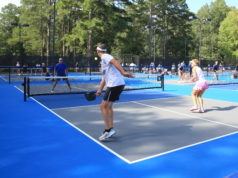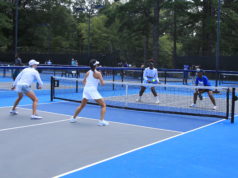By Page Love, MS, RDN, CSSD, USPTA
As you prepare for winter tennis, there are a number of things you should keep in mind for cold weather sporting activity. Whether you tend to get run down this time of year, are prone to colds/infections, have a hard time keeping your body warm while playing in the cold, or struggle with weight management this time of year, here are some tips to keep in mind for winter nutrition.
Focus on adequate and nutrient-dense carbohydrate fueling sources
Eating nutrient-dense carbohydrates can boost mood, muscle energy, and help you with hydration in the winter months. These complex carb sources help raise a neurotransmitter called serotonin, which helps elevate positive mood. Sometimes in the winter, we have the “winter blues.” Complex carbs help with training energy and motivation. They are stored as glycogen in our muscles and hold water molecules, which helps to maintain hydration at a time of year when we often forget to hydrate well. Try the following healthy carbs for a winter boost:
- Whole grains such as breads, brown rice, quinoa, and oatmeal
- Seasonal produce such as beets, sweet potatoes, yams, fall and winter squash
Consider adding vitamins C, D, and zinc sources to your diet
Since we are prone to more colds/infections this time of year, consider adding vitamins such as C, D, and zinc, that will help meet the suppressing immune side effects of exercising in the cold weather.
- Vitamin C, is found naturally in colorful fruits, such as oranges and vegetables such as tomatoes, boosts your immune system and makes you more resistant to infections and colds.
- Because our bodies manufacture vitamin D from exposure to the sun, we are limited to this exposure in the winter months. Adding fortified sources such as milk and considering supplements if you test low for vitamin D can help reduce risk of developing depression and boost your immune system.
- Additionally, the mineral zinc, naturally found in protein sources such as fish, dairy, eggs, and some cereals, also can help in fighting infections as well.
Keep your diet full of your nutrient-dense seasonal fruits and vegetables this winter to better help meet these nutrient needs. Even frozen versions are good options if you can’t get fresh foods. Very little nutrient loss occurs for frozen veggies, and these are excellent sources of key nutrients, especially choices like broccoli, Brussels sprouts, squash, and carrots.
Focus on hydration and even consider green tea
During the winter months, it’s especially important to stay hydrated because we often will not crave fluids like we normally do in the hot months and you may still be prone to dehydration. Cold weather actually blunts our thirst, although we are still losing fluid through our breathing. When it is cold outside, you may be tempted to consume more hot, caffeinated beverages to keep yourself warm. Consider green tea as a healthier alternative that will provide you some hydration and some antioxidants too. Adding green tea to your day will help you stay warm, but also can help in building immunity. Consider the following hydration tips during the winter months, especially if you’re on the courts:
- Prepare for matches by trying to drink 16-24 ounces of water in the several hours before you go on court.
- On the court, use an insulated bottle, and keep fluids air temperature. Aim to drink 4 oz of fluid at every change over during matches. Ice-cold fluids will make you colder, so slightly warmer fluids are more ideal for hydration during this time of year.
- Aim to drink .5-1 liter per hour of hydrating fluids even if you are not thirsty.
- Still post-hydrate after matches, continuing to drink your water or sport beverage immediately following matches/practices.
- Keep in mind that normal hydration minimums for the day are 2-3 liters for most adults.
- Beverages that count for appropriate off-court hydration options are: water, sport beverages, juices, milk, smoothies, and low-caffeine beverages.
- Don’t forget to keep your head and body thoroughly covered in layers to help your body further thermoregulate. You can actually lose 30-40 percent of body heat through your head, so keep those warm caps on during matches!
Moderation with holiday goodies and lower activity levels are the key to keeping off those extra winter pounds
Instead of avoiding your favorite desserts and holiday goodies, try a mindful allowance of these in individual portions. Try sitting down at a table with a single serving of a dessert or cookies, then take your time to enjoy and savor that dessert with a cup of tea. Also consider trading out healthier alternatives for rich foods such as low-fat whipped cream or lower sugar hot chocolate. Choose real foods such as fresh fruit and dairy such as vanilla Greek yogurt or low-fat chocolate milk to help meet sweet craving needs.
Also, if you try to eat on a regular schedule, eating every 3-5 hours during the day, or even six smaller meals can help keep you full and resist the temptation of overeating. Focus on high-fiber foods and lots of fruits and vegetables at all meals to continue to meet your overall energy needs and to help combat cravings. This regular eating schedule will raise your metabolism and help you to maintain higher energy levels and to perform at your peak this winter season!
Page Love, MS, RDN, CSSD, USPTA is on the USTA Sport Science Committee and is a nutrition consultant to both the ATP and WTA professional tennis tours. She runs a private practice in Sandy Springs and Buckhead, and can be reached at nutrfitga.com.




